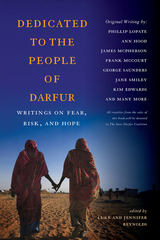
Nobel and Pulitzer Prize winners, a gallery of O.Henry award recipients, and many best-selling authors come together to share personal and compelling challenges and experiences. From contemplations on past drug use to reflections on gun control, social justice, passion and its sacrifices, and adventures such as skydiving, mountain climbing, and golfing, the topics vary greatly. This kaleidoscopic anthology is a commentary on the lives of prominent literary artists and ordinary citizens who have made simple, yet powerful choices that provoked change in one's self and for humanityùmuch the same way that Luke and Jennifer Reynolds do by building this invaluable collection for readers and the world of human rights.
Not too long ago, as struggling graduate students, Luke and Jennifer Reynolds conceived this uniquely themed volume as a way to raise funds to support ending the genocide in Darfur. Some people carry signs, others make speeches, many take action. What is most special about this book is that it extends beyond words and ideas, into a tangible effort to effect change. To this end, all royalties from the sales of Dedicated to the People of Darfur:Writings on Fear, Risk, and Hope will benefit The Save Darfur Coalition, an organization that seeks to end the genocide in Darfur, Sudan.

Perhaps the most exciting aspect of the Harvard University Library today is that in this largest university library in the world primary emphasis is placed upon a regard for the individual which extends alike to staff, faculty, students, and general users. As director of the Library, Paul Buck was responsible for this attitude. This book reflects his view that as the center of university education and research a library owes a responsibility both to the people who use libraries and to those who operate them. Personal consideration must be united with the mechanization and automation that is essential in developing a modern library's collections, circulation, and special services.
Here are addresses, articles, and reports in which Mr. Buck interprets the Harvard Library to its own staff, to the academic community, and to the general public. For the general reader who wants to know something of the nature and significance of university libraries, the author presents a historical view as well as an interesting picture of what the largest library of its kind is doing today.
The collection begins with a talk given at Monticello in 1954 in which Mr. Buck announced his university library credo, emphasizing the importance of the university library, its personnel, and its services to the community. This credo he restates at the end of this volume. Throughout the book are speeches bearing on the author's conception of libraries for teaching and research as well as a description of the administrative program at Harvard that he based on this conception.
He analyzes problems involved in recruiting, training, and retaining a quality staff of professional librarians. In one article he deals with the new personnel program adopted by the Harvard Library in 1958. In another he is concerned with the remarkably successful plan for recruiting "library interns" that is now in operation at Harvard. Still another paper discusses a landmark of his administration, the installation of a mechanized circulation system.
Included here also are addresses reflecting Mr. Buck's broad historical perspective. He deals with the long-range future of libraries generally and with the prospects of American universities. He is concerned with relations between historians, librarians, and businessmen. In a short paper he touches on another landmark of his administration--the first steps taken in planning the John F. Kennedy library.
READERS
Browse our collection.
PUBLISHERS
See BiblioVault's publisher services.
STUDENT SERVICES
Files for college accessibility offices.
UChicago Accessibility Resources
home | accessibility | search | about | contact us
BiblioVault ® 2001 - 2024
The University of Chicago Press









